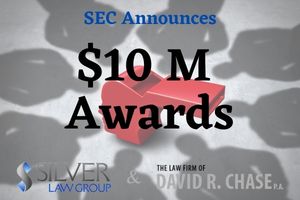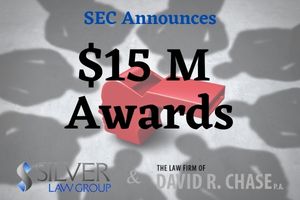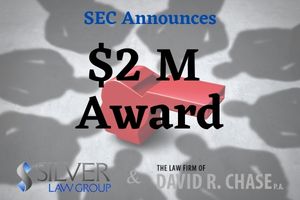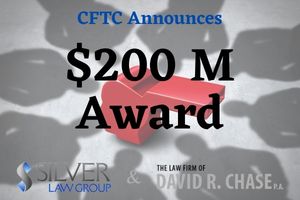 After a broker or investment advisor leaves a FINRA member firm, a broker dealer is required to file a Form U5 with FINRA. This form details the broker’s termination. This is the case even if the broker voluntarily terminates his or her employment, or the individual is no longer working as a broker, but is still working for the firm in a different capacity. Continue reading
After a broker or investment advisor leaves a FINRA member firm, a broker dealer is required to file a Form U5 with FINRA. This form details the broker’s termination. This is the case even if the broker voluntarily terminates his or her employment, or the individual is no longer working as a broker, but is still working for the firm in a different capacity. Continue reading
SEC Awards More Than $10 Million To Multiple Whistleblowers
 In three orders, the SEC announced the award of $10.4 million to several whistleblowers for information that led to three different enforcement actions. Continue reading
In three orders, the SEC announced the award of $10.4 million to several whistleblowers for information that led to three different enforcement actions. Continue reading
Grounds For Whistleblower Disclosure Of Securities Violations
 The U.S. Congress has established whistleblower programs with monetary awards to incentivize individuals to report possible violations of the federal securities laws to the Securities & Exchange Commission and the Commodities Futures Trading Commission. The information reported to these agencies can be past, ongoing, or future fraudulent activities. They include: Continue reading
The U.S. Congress has established whistleblower programs with monetary awards to incentivize individuals to report possible violations of the federal securities laws to the Securities & Exchange Commission and the Commodities Futures Trading Commission. The information reported to these agencies can be past, ongoing, or future fraudulent activities. They include: Continue reading
The Securities Fraud Whistleblower Journey
 Whistleblowers help maintain the integrity and fairness of U.S. financial markets. They are a vital watchdog and play an essential role in the securities markets.
Whistleblowers help maintain the integrity and fairness of U.S. financial markets. They are a vital watchdog and play an essential role in the securities markets.
The whistleblower process can be vigorous and draining and comes with risk. Once a whistleblower decides to take a moral stand on what is right, they must carefully prepare for the process and possible consequences. Continue reading
Government Agencies Regulating Securities & Investment Fraud
 Several agencies are involved in regulating the securities industry and enforcing laws governing investment fraud. Each agency has its own staff and set of rules. Our securities & investment fraud lawyers will help you determine the best place to file your whistleblower claim. Continue reading
Several agencies are involved in regulating the securities industry and enforcing laws governing investment fraud. Each agency has its own staff and set of rules. Our securities & investment fraud lawyers will help you determine the best place to file your whistleblower claim. Continue reading
The Vital Role Of Informed And Experienced Counsel In Whistleblower Situations
 Whistleblowers should proceed from the very start—as soon as they suspect something is amiss—with the strategic guidance, support, and watchful eye of experienced counsel. The whistleblower path is fraught with difficulty and decision-making that cannot be done without the right attorneys to help. For example: Continue reading
Whistleblowers should proceed from the very start—as soon as they suspect something is amiss—with the strategic guidance, support, and watchful eye of experienced counsel. The whistleblower path is fraught with difficulty and decision-making that cannot be done without the right attorneys to help. For example: Continue reading
SEC Awards Two Whistleblowers More Than $15M In Bounties
 The SEC has announced its latest whistleblower awards for two individuals in the same case.
The SEC has announced its latest whistleblower awards for two individuals in the same case.
The first whistleblower received a bounty of more than $12.5 million after alerting the SEC to an ongoing fraudulent scheme. As a result, SEC staff initiated an investigation and the whistleblower offered continued support to them. Continue reading
Related Action Leads To An SEC Bounty Of $2M For One Whistleblower
 A whistleblower whose original information led to an investigation by the U. S. Department of Justice (DOJ) has also received a bounty of $2M from the Securities and Exchange Commission (SEC).
A whistleblower whose original information led to an investigation by the U. S. Department of Justice (DOJ) has also received a bounty of $2M from the Securities and Exchange Commission (SEC).
Recent amendments to the whistleblower rules mean that DOJ actions, such as deferred and non-prosecution agreements, are now subject to whistleblower awards. Continue reading
CFTC Whistleblower Earns Record $200M Award For Providing Information
 The Commodities Futures Trading Commission (CFTC) announced that almost $200 million was awarded to a whistleblower who provided information that contributed to an open investigation and led to successful actions by the CFTC, another U.S. federal regulator, and a foreign regulator. Continue reading
The Commodities Futures Trading Commission (CFTC) announced that almost $200 million was awarded to a whistleblower who provided information that contributed to an open investigation and led to successful actions by the CFTC, another U.S. federal regulator, and a foreign regulator. Continue reading
Retaliation—Understanding What It Is And Why It’s Such An Important Issue To The SEC
 Let me be clear: Retaliation protections are a key component of the whistleblower program, and we will bring charges against companies or individuals who violate the anti-retaliation protections when appropriate.
Let me be clear: Retaliation protections are a key component of the whistleblower program, and we will bring charges against companies or individuals who violate the anti-retaliation protections when appropriate.
—Jay Clayton,
Former Chairman, Securities and Exchange Commission Continue reading
 SEC Whistleblower Lawyer Blog
SEC Whistleblower Lawyer Blog

